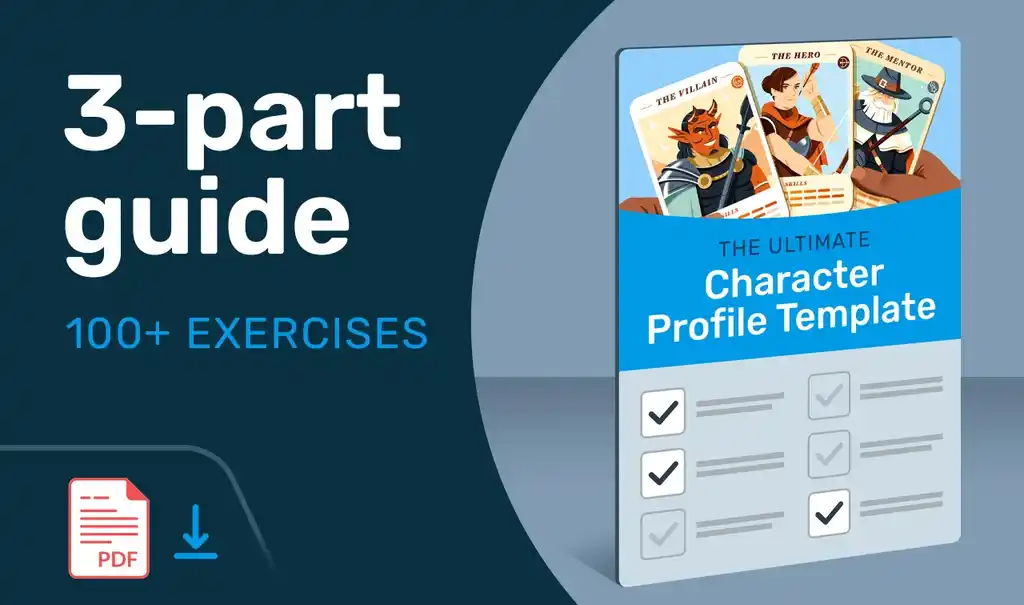A common writing trope I’m fascinated with is the “Mary Sue.” This is a character in a story — often the protagonist — who is impossibly good and capable and always makes the right decisions.
A Mary Sue is often viewed as an author proxy — a character that, in many ways, represents the writer’s fantasy of being cool and universally beloved. In my own writing, I have often seen my characters wander into Mary Sue territory, but my story will inevitably grind to a halt when I realize just how dull they are.
The truth is, without both strengths and weaknesses, a character just won’t be believable or compelling. Without flaws in their personality, their story has no suspense. They’ll always do the right thing. Also, without these shortcomings, how can readers relate to their journey? Unless you’re a psychopath (or Mary Poppins), you will struggle to empathize with a character who’s practically perfect in every way.
In this article, I’ll help you avoid Mary Sue Purgatory by talking about character flaws, what they are, and how they contribute to a story (depending on their type). As a bonus, I’ll give you a short list of potential flaws you can steal and use for your very own characters.
What is a character flaw?
A character flaw is a negative trait in a character. This quality will be, in some way, detrimental to them or those around them. Character flaws can range from minor flaws like ‘biting their fingernails’ to substantial shortcomings like ‘is a serial killer.’
A character’s flaws are defined in opposition to their strengths and are often related in some way. For example, a character who is confident (strength) may also be arrogant (flaw).
It’s important to note that character flaws are internal qualities not intrinsically tied to talent or skill. A character may be terrible at chess, but that is not a character flaw. However, their lack of ability with board games might be tied to their impatience, or the fact that they’re a sore loser — both of which are character flaws.
So, how can a character’s inherent imperfections affect their arc and the plot of their stories?
Types of character flaws
A character’s shortcomings can range from something relatively benign — a quirk or peccadillo, you might say — to something much worse, like a toxic personality trait that alienates all those around them. In the context of a story, the size of a character’s flaw will also determine what role they play in both the plot and the character’s arc.
Minor flaws make your characters more real
I find that the simplest way to avoid any whiff of the old “Mary Sue” conundrum is to give my characters some sort of minor flaw that some readers would find annoying or weak. This could be some sort of verbal tic, bad habit, or worldview — something that shines a bit of light on who your character is beneath the surface. To give you some examples:
🍸 In The Great Gatsby, the sophisticated, mysterious, and fabulously wealthy title character habitually calls everyone “old sport.” After a while, readers will catch onto this tic and find it off-putting. When we later discover that everything about Jay Gatsby is an illusion — he doesn’t come from old money — we put two and two together and realize that calling everyone “old sport” is an affectation. It’s a new-money millionaire’s best guess at how rich people speak.
🪖 In the TV series The A-Team, B.A. Baracus — the be-mohawked tough guy played by Mr. T — is terrified of flying. This minor flaw gives the show a running gag in which his (alleged) friends have to sneak sedatives into his sandwiches and bundle him into a helicopter. But more importantly, this fear of flying gives Baracus a sliver of humanity and stops him from being just a one-dimensional character who goes around calling everybody “fools.”

The trick here is that these minor flaws aren’t things your characters need to change about themselves for the story to resolve (though smaller flaws can hint toward bigger flaws, as in the Gatsby example). If your protagonist’s arc concludes with them resolving never to pick their nose again, I would suggest that your story lacks stakes and that you should maybe head back to the drawing board. Basically, instead of making them the crux of your story, use these minor flaws to make your characters human and relatable.
Free Character Development Template
A story is only as strong as its characters. Fill this out to develop yours.
Major flaws give your character something to overcome
Now we’re cooking with gas. Major flaws are the fuel that powers every great narrative. While your hero will certainly have strengths to help them overcome obstacles and defeat their enemies, the real thing that’s holding them back is their major flaw.
Again, this internal shortcoming must come from within your character, rather than an external skill they can practice and get better at. For example:
🥋 In Kung Fu Panda, our hero doesn’t have to overcome a lack of martial arts training to defeat the villain. It turns out that he has the power within him already — it’s his body image issues and self-doubt that he has to overcome.

Again, character flaws should be generally relatable to most people. I don’t know about you, but being bad at kung fu does not negatively impact my life. However, we’ve all had moments where we’ve felt like a fraud or like we weren’t good enough. By using that as the protagonist’s central flaw, Kung Fu Panda becomes universal.
I like to think of major flaws as based on lies the protagonist tells themselves. By the end of the story, they need to realize the truth of the matter, or else they’ll fail.
The football star needs to realize that they’re not a one-person goal machine and that they need to rely on their teammates. The tough cop must see that their actions have been racially motivated and decide to change. Once they see that this fundamental part of their worldview is a lie, they can overcome their flaw and win the day. But what happens if they don’t?
Tragic flaws will prove to be their downfall
Sometimes called fatal flaws, these are also major shortcomings in our characters’ beliefs. But where victorious heroes can overcome their major flaws by the end of the story, tragic figures will only realize them too late in the game.
As with all things tragic, the ancient Greeks have a word for it: hamartia, or “to miss the mark.” Indeed, the tragic hero’s flaw will usually cause them to make a mistake which causes an irreversible chain of events leading to their downfall. Case in point:
🔮 In Oedipus Rex, the ruler of Thebes believes that he has outwitted a prophecy that has been handed to him – but it’s the very act of trying to prevent his tragic fate that actually brings it about.
And as I’ve touched on above, for tragic flaws to have the greatest impact, they should be closely tied to the character’s greatest strengths. One more quintessential example:
⚔️ In Game of Thrones, we are introduced to Ned Stark, an honest and noble man brought into the viper’s nest of King’s Landing to serve as the King’s closest advisor. Readers (and viewers) love and admire Ned for these virtuous qualities — but ultimately, they are responsible for his misplaced belief that he lives in an honorable world. His inability to adapt to this treacherous world is what results in his early demise, as he is betrayed by characters jockeying for power.
:max_bytes(150000):strip_icc()/ned-stark_0-c817941b1fcc4f3a9673b95e8db4d450.jpg)
With these examples, I hope you can see just how essential character flaws are to great storytelling. Again: for your characters to be believable, relatable, and capable of driving a plot, they must have weaknesses both specific to them and fairly universal to the human condition.
40 character flaws (a non-exhaustive list)
When you draft your story, you may find that your characters start out a little flat or a little too perfect. If that’s the case, then usher them into the metaphorical changing room and let them try on some of these flaws for size. Who knows — they could be the key to cracking your protagonist’s true motivations!
Examples of minor flaws
-
Dullness. Do their stories go on forever?
-
Awkwardness: Are they tough to talk to comfortably?
-
Flightiness: Do they struggle to commit to the matter at hand?
-
Childishness: Do they have trouble taking things seriously?
-
Clumsiness: Are they a liability around Fabergé eggs?
-
Foolishness: Did they convert their life savings into Dogecoin?
-
Gullibility: Are they likely to believe anything they’re told?
-
Laziness: Can they be bothered going to the post office before it closes?
-
Timidity: Do they speak up for themselves?
-
Naivete: Are they aware of the dangers and realities of this world?
-
Pride: Can they admit when they are wrong?
-
Stubbornness: Do they refuse to cede to anyone else?
-
Spoiled: Do they feel entitled to whatever they want?
-
Tactlessness: Are they likely to insult others with their approach?
-
Vanity: Do they think that Carly Simon’s song is about them?
-
Sloppiness: Do they turn any room they inhabit into a dump?
-
Obliviousness: Can they see the effects of what they’ve done?
Examples of major and tragic flaws
-
Disloyalty: Are they willing to betray those who rely on them?
-
Apathy: Do they care about what happens to others?
-
Neglect: Do they fail to give the proper attention to important matters?
-
Arrogance: Are they always acting like they’re better than us?
-
Paranoia: Do they see enemies where there are none?
-
Cowardice: Will they stand up for what they believe in?
-
Hubris: Are they overconfident in their abilities?
-
Dishonesty: Will they lie for profit or convenience?
-
Envy: Do they resent others for what they have?
-
Judgmentalism: Are they always critical of others?
-
Lust: Do their lower brains often take the reins?
-
Possessiveness: Do they try to control those closest to them?
-
Fanatacism: Are they zealots to an unusual cause?
-
Rigidity: Are they incapable of compromising on anything?
-
Selfishness: Do they always act in their own interest, at the cost of others?
-
Fury: Are they quick to anger?
-
Spite: Are they often acting just to put others down?
-
Cruelty: Do they willfully cause pain to others?
-
Anxiety: Do their doubts get in the way of their goals?
-
Bigotry: Are their decisions ruled by their prejudices?
-
Obsession: Are they consumed by a single subject, at the expense of all else?
-
Self-destruction: Do they constantly sabotage themselves?
-
Greed: Do they always want more than they need?
I shall leave you with one parting thought: embrace your character’s flaws. While most readers would be reluctant to admit that they possess these qualities, we secretly know that we all have some combinations of these flaws. Watching a character recognize and overcome their foibles gives us all hope that we can one day also change for the better. And that, I believe, is the power of great storytelling.
About the author

Martin Cavannagh is a writer, editor, and Head of Content at Reedsy. As the host of Reedsy Live, Martin has had the pleasure of sharing cutting-edge insights from some of the world's best editors, designers, marketers, and the occasional bestselling author. His newsletters, live streams, and blog posts reach millions of writers each month, inspiring the next generation of beloved writers.








